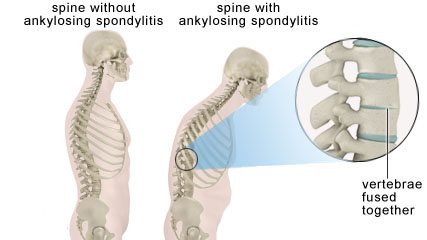Ankylosing Spondylitis (AS) is a chronic inflammatory spinal condition characterised by gradual onset back pain and loss of spinal movement due to gradual fusion of spinal segments. It is more common in males than females and average age of onset is 26 years.
Symptoms often start with low back pain or alternating buttock pain. Patients with AS often notice a restriction in forward bending along with pain that is worse at night or early morning. The most significant early warning sign is morning stiffness that can vary from 30 minutes to 2 hours to improve.

Pain and stiffness associated with AS often gets better with exercise and worse with rest as it is an inflammatory disorder, fatigue can also be associated with AS.
There is a genetic link, with 12% of cases having a family history of AS. It is unusual for the disease to commence in people older than 50. Other conditions associated with AS may include Uveitis (inflammation of the middle layer of the eye), Irritable bowel syndrome and Psoriasis.
AS is diagnosed with a blood test which shows elevated inflammatory markers and the presence of a specific protein called HLA-b27. Nine out of 10 people with AS test positive for HLA-B27. This protein indicates a higher risk of developing auto-immune disease.
X-rays often show sacroiliac joint sclerosis, although it may take 10 years for these changes to develop on x-ray. Hence an MRI is often ordered to confirm AS if x-rays are normal. The disease spreads from the pelvis into the spine where the vertebrae become fused resulting in loss of spinal movement, especially forward bending.
Some patients may develop soft tissue complications such as heel pain or foot pain as the disease progresses, cardiac or restrictive lung disease may also develop.
Management of AS involves a consultation with a doctor who specialises in arthritic conditions such as a Rheumatologist. The specialist will most likely order an x-ray of the lumbar spine and pelvis along with specific blood tests.
Treatment usually invloves physiotherapy to maintain spinal flexibility and exercises to maintain good posture. Hydrotherapy is a common form of low impact exercise to manage AS patients. Medications such as NSAIDS (non-steroidal anti-inflammatory drugs), cortizone and methotrexate are often prescribed to reduce pain from inflammation and to allow for management of ‘flare-ups’.
All Physica staff are trained in detecting the early warning signs of AS. We will devise a suitable exercise programme and refer you to the appropriate specialist for further management.

